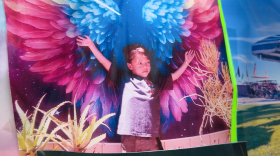The National Institutes of Health awarded UCSD, the Scripps Research Institute, the Burnham Institute and the Salk Institute nearly $13 million. Burnham researcher and neurologist Stuart Lipton says the grant is a milestone for local institutes because it affirms San Diego’s status as being on the cutting edge when it comes to brain research. Lipton says the grant also represents the dawn of a new era when various research institutions will work together rather than competitively to come up with cures.
Stuart Lipton: A lot of breakthroughs in brain research will come from interdisciplinary, that is, different disciplines that have nothing to do with the brain but have made some basic discoveries on molecular mechanisms, on cell mechanisms.
For instance, Scripps researchers are studying the biology of chemical addictions and Salk scientists are concentrating on gene therapy. Lipton says Burnham will focus on creating new drugs to treat diseases such as multiple sclerosis, Lou Gehrig’s, Parkinson’s and Alzheimer’s.
Stuart Lipton: Our lab has actually developed the latest drug for Alzheimer’s disease, which is known as Nemenda, which is not a cure for the disease which is kind of the best we can do. I think I felt pretty good when the studies were blind and some patients began to recognize their loved ones or caregivers again, which, if you’re the caregiver, it’s a huge thing.
Lipton says he hopes news of the grant will spur San Diegans to learn more about Burnham’s research and prompt more moral and financial backing.
Stuart Lipton: There’s a diamond in the rough here in San Diego. We really want the community to support it like they support the opera or symphony. This is your San Diego at work. It’s brain research. A lot of people are touched by this and we really want their help.
Lipton says that while the $13 million grant sounds like a lot of money, it’s just provides a start because it will be divided among four institutions and 200 researchers. Lipton says more philanthropy gifts by private donors are needed.





